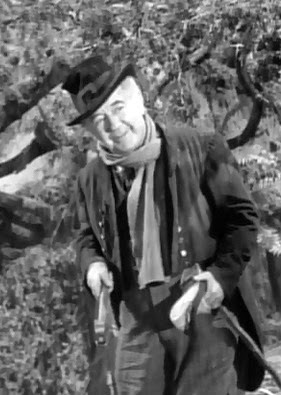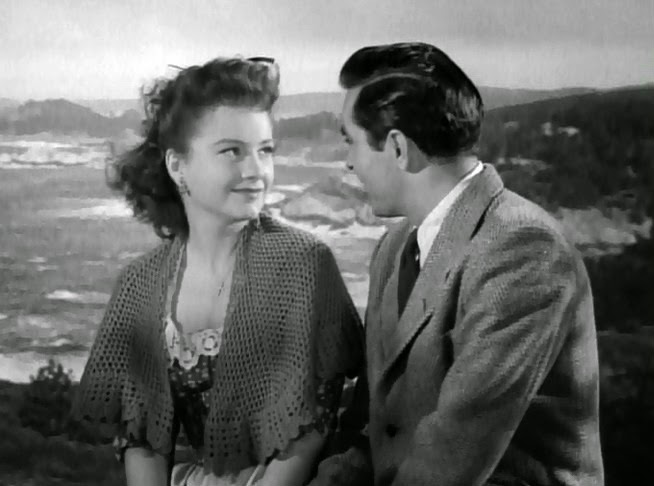It's not often when a man is clever enough and quick enough to capture a leprechaun. While travelling in Ireland, Steven Fitzgerald (Tyrone Power) does just that and then, having done so, lets the leprechaun free...without claiming his pot of gold!
'Tis a rare man indeed who would do such a thing, and the leprechaun knows it. He feels a debt of gratitude to this American and, leaving the comfort of his homeland and his secluded waterfall, he follows him into the "cold, inhospitable city" of New York to serve him and to help him realize his heart's desire.
"You are a proud, free man, and it is for that reason that I am proud to serve you"
Fitzgerald is a news reporter who believes in writing the truth to the public, but the lure of acquiring wealth by working for power-hungry publisher-turned-politician Augur (Lee J. Cobb) proves to be irresistible, even if it costs him his integrity as a free-thinking man. Egging him on in his decision to accept this position is Augur's daughter (Jayne Meadows), a woman who wants to be by Fitzgerald's side as he climbs the ladder of success, no matter what it takes.
The Luck of the Irish is a dramatic fantasy filled with many whimsical moments. It does not have the sugary sweetness of a children's fable, making it all the more satisfying. Instead it has a lasting charm which makes it ideal for annual viewing on St. Patrick's Day, or any time of the year for that matter.
The first half of the film parallels Michael Powell's I Know Where I'm Going (1945) in that we see a city dweller stranded in a small village, anxious to escape on the next boat available and frustrated with the local people's slow and inefficient ways. It is not until the opportunity to escape becomes available that these characters begin to have doubts on whether they truly want to leave. In both films, it is the romance they find in these villages which make the characters wish to remain, not the lure of the tranquil community.
In The Luck of the Irish, Fitzgerald meets and falls in love with Nora (Anne Baxter), a quiet innkeeper's daughter, and upon his return to New York he sees her once again, by chance, on a subway. He has a notion that the leprechaun may have had a hand in bringing her to New York but he struggles to relinquish his dream of wealth in place of returning to Ireland with Nora.
"You brought Nora here, didn't you?"
"No, you brought her yourself...in your mind, long ago."
Steven Fitzgerald is an ageless character - working men are forever torn between following the dreams of their heart or selling out their ideals (and sometimes their morals) to other men for the sake of financial stability. He is a cynical man and does not easily get himself beguiled into believing in leprechauns or other folklore but, in this situation, his belief becomes his blessing.
The Luck of the Irish is not your traditional fairy-tale story and the irascible leprechaun with his proverbial pot of gold is not portrayed as a cultural image but instead becomes the incarnation of Fitzgerald's conscious and a vehicle of divine influence in changing his circumstances. The moral of film is summed up in its tagline "Choosing good is the real pot of gold".
"I offered you gold. 'Tis not my fault that you prefer a pebble"
The Luck of the Irish premiered on September 14, 1948, and for its original showing featured a wee bit o' something green - all of the Ireland sequences were tinted the color of the Irish landscape itself. Indeed, the opening sequences of Ireland are so pleasant that it is a shame when, midway through the film, its focus shifts to New York City.
A roster of 20th Century Fox's regular talents gathered together to make this a stand-out picture: director Henry Koster, who was an old hand at filming humorous dramas; Lyle Wheeler, Fox's resident art director extraordinaire; Philip Dunne, who hammered out on his magical typewriter this whale of a grand adaptation (from the novel by Guy and Constance Jones); and producer Fred Kohler, who had footed the bill one year prior for that other excellent romantic-fantasy The Ghost and Mrs. Muir. The strains of traditional Irish and English melodies can be heard in the background thanks to the musical wizardry of Cyril Mockridge.
Cecil Kellaway steals the film with his performance of "Horace", the leprechaun turned manservant, and he nails the Irish accent and mannerisms of one of the little people. He was nominated for an Academy Award for Best Supporting Actor for his portrayal. James Todd also co-starred as Fitzgerald's wise-cracking pal Bill Clark, and J.M. Kerrigan and Phil Brown round out the stellar cast.
Anne Baxter is particularly fetching and these years were certainly the peak of her career. The brightness of Tyrone Power's star had been waning a few years prior to The Luck of the Irish and he must have sensed that his days of being the studio's No. 1 glamour boy were nearly over, even though he was as handsome as ever. Jayne Meadows related a story about this in the special "Jayne Meadows Remembers" included on the DVD:
"[in-between takes during the banquet scene] he said, 'You see that tall man over there, the one with the grey hair? He was a star once. A very big star. Sad...now he is an extra'. And I said 'Isn't it wonderful that he's still working' because, you know, the man looked like he needed something to hold him up. When I later found out that Ty started as an extra, I thought 'isn't it interesting that his first reaction was to the old man who was a star and is now an extra.' "
Perhaps Tyrone Power felt that eventually this would be his fate as well.
This post is our contribution to The Luck of the Irish Blog o'thon, being hosted by yours truly. To check out all of the grand posts about Irish actors and films, click here.












